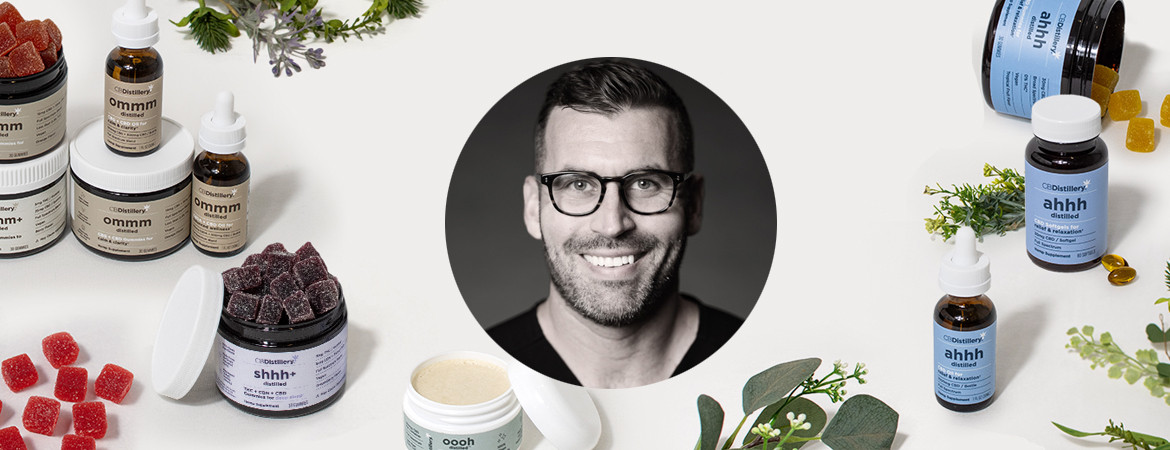- Free Shipping Over $75
- 60-Day Money-Back Guarantee
Shop Popular Products
Made from US-Grown Industrial Hemp
100% Clean Ingredients
Rigorously Tested, Quality Assured

Here at CBDistillery®, we know that taking charge of your health and wellness is a daunting task and it's sometimes overwhelming to know whose recommendations to rely upon.
Transparency is key to our approach in every aspect of our business, which is why we wanted to introduce a series of conversations with CBDistillery® staff as well as other experts in their fields. We hope that these conversations will offer more information about our company and products and help foster trust in our products.
Recently we partnered with a new Medical Advisor, Dr. Ryan Greene, who sat down with Content Strategist Adrian Crawford to discuss his inspiration to pursue medicine, how he came to be interested in cannabinoids in the treatment of patients' ailments, and his viewpoint on the future of the cannabis industry.
Adrian Crawford: Let’s start at the beginning. What made you want to pursue medicine and, in particular, the discipline you ended up in?
Dr. Ryan Greene: In the spirit of full transparency, what I am doing now was never a thought in my mind as I navigated medical training. I always wanted to work with active individuals and help people heal, first and foremost, leading to ultimately a higher quality of life. While going through training I realized by the time patients got to me, many opportunities to treat the ailments they were presenting with had been missed. Thus, when the opportunity presented itself, I chose to take an alternate route to learn more about preventive intervention which led to what and how I practice now.
AC: Could you explain to me, a medical layman, what osteopathic medicine entails?
RG: In brief, osteopathic medicine is similar to traditional allopathic medicine (MD’s) in terms of scientific principles of practice. That being said, our practice focuses on optimizing the innate healing capacity of the human body knowing all aspects of our anatomy and physiology are connected. Many osteopaths still use manual treatment techniques (treatments using their hands) to assist traditional treatment practices although for the most part DO/MDs have overwhelmingly similar practice philosophies
AC: Can you tell me a little bit about your background and training?
RG: I initially trained as a surgeon. I enjoyed knowing I could treat and start the path of healing with my hands. Fixing issues I could literally visualize. As I went through training I recognized there were many basic elements of health that were being overlooked and needed attention, thus I shifted my practice to the preventive area of medicine to allow patients to understand that by building a practice that optimized our incredible natural healing ability, we could live a long and healthy life
AC: Would you elaborate on your position as an advocate for minimal intervention and supporting the innate healing power of the human body?
RG: The fact we live as long as we do with how the majority of us treat our bodies is a testament to our innate resilience. That being said, small lifestyle changes performed consistently that may also be supported by high quality natural compounds can work wonders for a variety of issues we see commonly in our population
AC: When it comes to treating physical and mental ailments, what are the pros and cons of the “quick fix” versus remedying the root cause even if the latter is a longer process?
RG: There is no such thing as a quick fix. We can mask symptoms quickly, but fixing takes time, commitment and consistency. Very few health issues are randomly generated. If we can take the time to understand how to optimize ourselves, the solutions we implement will be more effective and longer lasting
AC: How did you come to learn about CBD as a potential wellness benefit?
RG: I have been following the integration of cannabis, hemp, THC and CBD over the last decade and been fascinated with the outcomes appreciated with something that was villified for so long. After working to understand the mechanism and using the product myself and with patients, I have seen the incredible capacity for potential benefit when CBD is used appropriately and with high-quality product.
AC: Would you say there has been an increased take-up in natural or alternative medicines and remedies over the past few years? If so, why do you think that is?
RG: I believe people are starting to understand that, for every potential benefit of a pharmaceutical medication, there are many potential side effects, and few are beneficial. With the opioid epidemic and the fact everyone seems to be given “a pill for every ill”, the natural inquisitive nature of humanity is starting to yearn for more natural and effective solutions.
AC: From the viewpoint of a medical practitioner, what do you think the future holds for the cannabis industry when it comes to healthcare applications, FDA regulation and issues like that?
RG: I believe we will start to see a broader appreciation and adoption of cannabis-based therapies. The government holds the patent for the use of cannabis for certain health conditions, so they clearly understand. Making sure the participants in the space are providing high quality product is certainly an area of concern that will need to be addressed as there have been many bad actors looking to reap on the opportunity CBD and cannabis have provided as of late
AC: Is there anything that existing CBD users or potential new entrants to these types of products might want to know that we haven’t covered?
RG: What and how you use CBD and THC matters equally as much as the quality of the product. Being able to work with groups that have done due diligence so the patient understands exactly what and how much of any product should be used will yield the greatest benefit for the largest number of people.